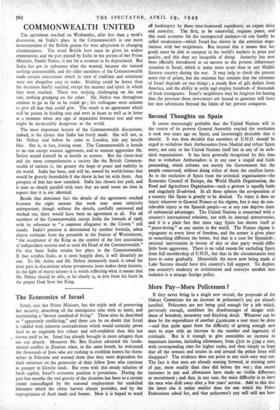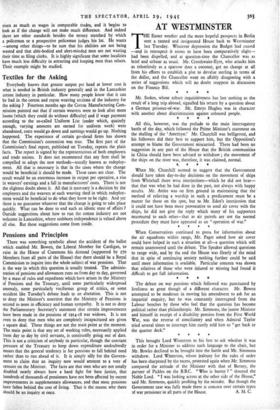More Pay—More Policemen ?
If they never bring in a single new recruit, the proposals of the Oaksey Committee for an increase in policemen's pay are already justified. Policemen are not being paid enough for a job which, perversely enough, combines the disadvantages of danger with those of boredom, monotony and finicking detail. Whatever can be done by the expenditure of another L4,000,000 a year must be done and that quite apart from the difficulty of getting enough new men to cope with an increase in the number and ingenuity of criminals. But is it enough to give constables an increase in maximum income, including allowances, from £522 to £594 a year, with corresponding rises for higher ranks, and then simply to hope that all the stresses and strains in and around the police force will disappear? The evidence does not point to any such easy way out. The fact is that men are already coming forward, at existing rates of pay, more readily than they did before the war ; that recent increases in pay and allowances have made no visible difference, to recruitment ; and that, in any case, the main difficulty is to keep the men who drift away after a few years' service. Add to this that the latest rise is rather smaller than the one which the Police Federations asked for, and that policemen's pay will still not have risen as much as wages in comparable trades, and it begins to took as if the change will not make much difference. And indeed there are other standards besides the money standard by which a policeman or a prospective policeman judges his lot. He wants —among other things—to be sure that his abilities are not being wasted and that able-bodied and alert-minded men are not wasting their time as filing clerks. It is highly significant that some localities have much less difficulty in attracting and keeping men than others. Their example might be studied.



































 Previous page
Previous page